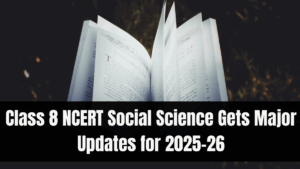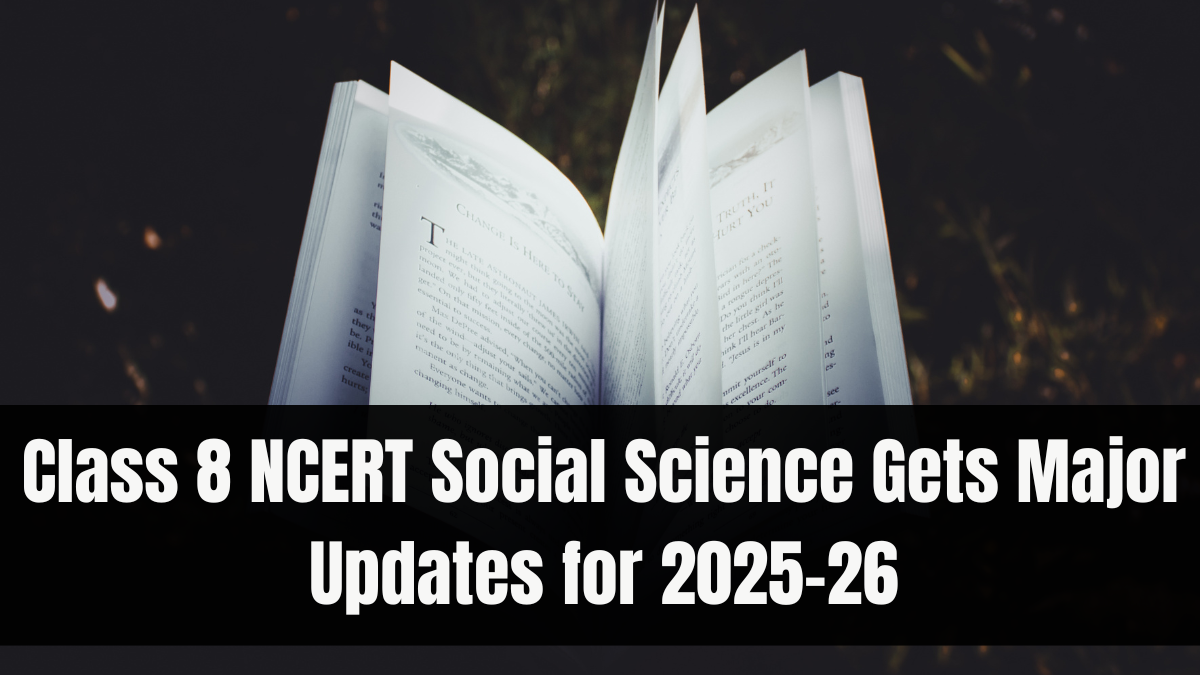India’s school curriculum is undergoing a significant transformation, and Class 8 students are at the forefront in 2025. The NCERT Textbooks Changes Class VIII 2025 introduce revised Social Science content with better historical accuracy, modernized framing, and deeper contextual understanding. These updates are aligned with the National Curriculum Framework (NCF) 2023, making the new books more inclusive, critical, and learner-focused than ever before. Students, teachers, and parents will notice meaningful differences in how history, geography, civics, and economics are taught at the middle-school level.

What’s New in Class 8 Social Science Textbooks?
The updated NCERT Social Science books reflect a fresh approach to history and society. Key updates include:
-
Richer historical narratives with regional and subaltern perspectives
-
More focus on women freedom fighters, tribal resistance, and marginalised voices
-
New chapters added on contemporary environmental issues and globalisation
-
Simplified maps, infographics, and timelines to aid visual learning
-
Case-study-based exercises encouraging critical thinking over rote learning
The revised textbooks are designed to enhance engagement and align more closely with modern classroom pedagogy.
Revised History Content: A Broader National Story
The history section of NCERT Textbooks Changes Class VIII 2025 now includes:
-
More content on post-1857 revolts, princely states, and resistance movements
-
Expanded coverage of Dalit leaders and reformers
-
Balanced depictions of colonial rule and indigenous response
-
Updated language to ensure neutrality and fact-based presentation
These changes help students explore Indian history through multiple lenses, not just a central narrative.
Civics and Economics: Policy Meets Practice
Civics chapters now reflect recent changes in governance, constitutional rights, and local bodies. Major additions include:
-
Case studies on local panchayats and urban governance
-
Real-life examples of RTI, public service delivery, and judicial activism
-
Introduction of digital citizenship and ethical use of media
In Economics, the updated chapters introduce contemporary issues like:
-
Sustainable development goals (SDGs)
-
Rural-urban migration
-
Circular economy basics and waste management
These changes equip students with practical knowledge of society and governance in today’s world.
Better Visuals, Language, and Layouts
The Class 8 NCERT Social Science textbooks now feature:
-
Simplified, inclusive language to help learners from diverse backgrounds
-
Large, full-colour illustrations and photographs to make content engaging
-
Activities and discussion points encouraging classroom interaction
-
Summary boxes and keywords for each chapter
Teachers are also provided with digital teaching aids and curriculum-linked worksheets to ensure effective classroom delivery.
Rollout Timeline and Teacher Training
The new textbooks were distributed starting in April 2025 and are being used in all CBSE and affiliated schools across India. To support this transition:
-
Orientation workshops for Social Science teachers have been conducted in phases
-
Bridge programs are available to help students shift from older content
-
NCERT is offering online support material and Q&A portals for classroom doubts
This ensures a smooth transition from the older syllabus to the new learner-centric framework.
FAQs
What changes have been made to the Class 8 NCERT Social Science books?
New chapters, updated maps, inclusive history narratives, and real-life case studies have been added, making the content more modern and relatable.
Why were these changes introduced in 2025?
The updates align with the National Curriculum Framework 2023 and NEP 2020 goals to make learning more critical, inclusive, and contextual.
Are the new books mandatory across all schools?
Yes. All CBSE and affiliated schools are required to adopt the revised Class 8 NCERT Social Science textbooks starting from the 2025–26 academic year.
What support is available for teachers?
NCERT has conducted training sessions and released bridge programs and digital resources to help teachers deliver the new curriculum effectively.
How do these books help students better?
They provide improved readability, real-life applications, critical thinking exercises, and a broader understanding of Indian society and history.
Click here to know more.




